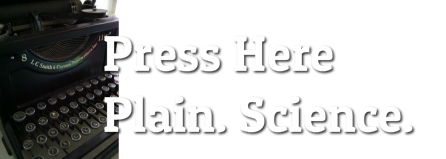This blog by Center for Plain Language Board Member Brian Berkenstock tackles an issue we hear all of the time about plain language.
Blog Dealing with the “dumb down” dinosaur, or how to enlighten the ignorant without losing your job. It continues to shock me that in the year 2014 I still hear people say, “Oh, you want to dumb down my writing” when the subject of plain language comes up.
My reaction is
a. A long, exasperated sigh or
b. A clenching of jaw and fists.
My response depends on my mood.
I hope I’m wrong, but I imagine you may face archaic thinking like this in your world. These “dumb down” dinosaurs are everywhere — the halls of academia, the private sector, government.
If I’m having a rare, at-the-end-of-my-rope kind of day, something regretful may slip out, like, “The only dumb thing is to keep writing as poorly as you do.” (I do not recommend this approach.)
On slightly better days, I talk to these folks like a teacher addressing a slow student — with a broad smile and lots of encouraging head nods: “No, Billy, plain language doesn’t dumb down anything. It makes reading easier and faster. And not just for weak readers. Research shows that busy, smart people prefer simple and clear language, too.”
Then there are the days when I do it right. When I feel proud of myself for not being snarky. Days when I stay positive. When I remember that it’s not their fault that they don’t know what we know.
Spreading the gospel of plain language works best with sincerity.
So on those good days, I talk about the volumes of research that support the use of plain language. And I let people know that Europe, Canada, Australia and New Zealand are about a decade ahead of the U.S. in their thinking around plain language. (This gets competitive types worked up.) Finally, I remind people that readers have more options today than ever before. Readers can easily find whatever we’re offering somewhere else, so if we do a poor job communicating, we will surely lose them.
If all my efforts fail to enlighten someone to the value of plain language, I take solace in the fact that their anti-plain language views, like the dinosaurs, will one day go extinct.
About the author: Brian Berkenstock is a Center for Plain Language Board Member, and a Senior Communications Consultant at Aetna.
Learn more about Brian
Blog Dealing with the “dumb down” dinosaur, or how to enlighten the ignorant without losing your job. It continues to shock me that in the year 2014 I still hear people say, “Oh, you want to dumb down my writing” when the subject of plain language comes up.
My reaction is
a. A long, exasperated sigh or
b. A clenching of jaw and fists.
My response depends on my mood.
I hope I’m wrong, but I imagine you may face archaic thinking like this in your world. These “dumb down” dinosaurs are everywhere — the halls of academia, the private sector, government.
If I’m having a rare, at-the-end-of-my-rope kind of day, something regretful may slip out, like, “The only dumb thing is to keep writing as poorly as you do.” (I do not recommend this approach.)
On slightly better days, I talk to these folks like a teacher addressing a slow student — with a broad smile and lots of encouraging head nods: “No, Billy, plain language doesn’t dumb down anything. It makes reading easier and faster. And not just for weak readers. Research shows that busy, smart people prefer simple and clear language, too.”
Then there are the days when I do it right. When I feel proud of myself for not being snarky. Days when I stay positive. When I remember that it’s not their fault that they don’t know what we know.
Spreading the gospel of plain language works best with sincerity.
So on those good days, I talk about the volumes of research that support the use of plain language. And I let people know that Europe, Canada, Australia and New Zealand are about a decade ahead of the U.S. in their thinking around plain language. (This gets competitive types worked up.) Finally, I remind people that readers have more options today than ever before. Readers can easily find whatever we’re offering somewhere else, so if we do a poor job communicating, we will surely lose them.
If all my efforts fail to enlighten someone to the value of plain language, I take solace in the fact that their anti-plain language views, like the dinosaurs, will one day go extinct.
About the author: Brian Berkenstock is a Center for Plain Language Board Member, and a Senior Communications Consultant at Aetna.
Learn more about Brian

 RSS Feed
RSS Feed